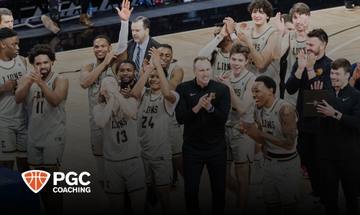Embrace Adversity: Turning Tough Losses Into Opportunities
What do you do after a tough loss? The weight is heavy, thoughts rolling through your head, and the ‘if onlys’ start to creep in. At this point, it’s easy to blame the refs, complain about players, and point fingers. But as a coach, you’re actually at a fork in the road…
You can choose to embrace adversity in basketball or succumb to the common “ABC—accuse, blame, and complain” mentality.
It goes without saying that while it’s an easy route, ABC is not ideal. So let’s look at ways to turn adversity into opportunity and lead your team through tough times with energy, determination, and accountability.
Oh! And before I share how to turn adversity into opportunity, here are a few more tools you may want to add to your toolkit–check them out after this:
- How to Build a Winning Basketball Culture: 5 Daily Habits for Coaches
- 7 Ways to Build a Winning Culture in Your Basketball Program
- How to Break Down Game Film as a Coach: A Post-Game Blueprint
- 5 Principles to Transform Player Development
Anyhow, let’s dive into the topic at hand…
Embrace Adversity in Basketball with DEFTH
The acronym is strange, but you’ll likely remember it. DEFTH stands for:
- Determined
- Energized
- Find a way
- Transform the situation
- Hold each other accountable
Here’s how you use each step to your advantage
1. Get Determined:
All eyes will be on you. Your players will be looking to you for direction and watching how you respond to the situation. When you show up determined, ready to take this head-on, they’ll follow your lead.
2. Get Energized:
It’s not often you see a leader show up energized about a problem. But when they do, it’s inspiring and contagious. So get fired up about the situation and how you’ll use it to better the team.
3. Find a Way:
Here’s where the rubber meets the road. Maybe it’s adjusting your game plan, sharpening some skills, or spending more time in the film room. Regardless of what it is, remain persistent and resourceful.
4. Transform the Situation:
This is where we see separation. What could have set you back will now propel you forward. Put your plan into place and get to work.
5. Hold Each Other Accountable:
It’s everyone’s responsibility to push forward from here, to take ownership for their part, to hold each other accountable and ensure this one step back results in many steps forward.
The Reality of Adversity
When broken down DEFTH is simple. It’s also easier said than done. Embracing adversity in basketball is one of the hardest things to do. But I’ve seen firsthand how it can change the course of a season, turning what could have been a 3-game losing streak into a 2 or 1-game losing streak.
And those are just the tangibles. When you embrace adversity in basketball, you’re changing lives. You’re teaching young men or women life lessons that they’ll use long after their final game.
FAQ: How to Embrace Adversity and Lead Through Tough Losses in Basketball
Q: What should a coach do immediately after a tough basketball loss?
A: At this point the emotions are high and you’ve had very little time to process. Most coaches turn straight to accusing, blaming, or complaining. However, that does far more damage than good. Instead, pause and take time to reflect. After you’ve had a chance to process the loss, show up as a leader—assess the situation with clarity, reinforce belief in the process, and set the tone for your team’s response.
Use your post-game talk to re-center your players—acknowledge the pain, but refocus on progress.
Q: How can I teach my team to embrace adversity in basketball?
A: This is one of the biggest and most rewarding challenges in any sport. If you can teach your team to embrace adversity it will not only help them on the court, but it’s a skill they will carry through life. The best tool we’ve found is the DEFTH acronym:
- Determined
- Energized
- Find a way
- Transform the situation
- Hold each other accountable
Use real moments to coach through it. When your team sees you model these traits after a loss, they’ll begin to adopt the mindset themselves.
Print out the DEFTH acronym and post it in your locker room as a daily reminder of your program’s values.
Q: Why is showing energy after a loss so important?
A: Energy after adversity signals belief. When players see you energized—not discouraged—they’re more likely to stay mentally engaged and believe that better is possible. It builds contagious resilience, and that’s often the difference between one loss and a losing streak.
Reframe adversity as “fuel”—and share examples of how past setbacks created comebacks.
Q: How do you hold players accountable without killing morale?
A: There’s a big difference between accountability and blame. Accountability lifts a player to their potential, while blame shames them. That said, it’s important to set clear standards early, revisit them often, and create a culture where players are expected to self-correct. Use film, peer feedback, and reflective questions like “What did you notice there?” to foster ownership instead of shame.
During adversity, shift the tone from “What went wrong?” to “What’s our opportunity here?”
Q: What if the team starts pointing fingers after a loss?
A: Reinforce the idea that every possession is a shared responsibility. Encourage your players to pause and reflect on what part of the breakdown they own before they go pointing fingers at teammates.
Use practice huddles to re-align the team’s mindset and highlight unselfish, effort-based wins.
Q: How can losses actually improve team culture?
A: Losses reveal weaknesses—but they also present rare moments for realignment. A team that grows from adversity builds trust, humility, and mental toughness. Coaches who embrace tough moments often create the most connected and battle-tested cultures.
Debrief after losses using “lessons learned” sessions to turn pain into progress.
Q: Can this mindset shift actually change the season’s outcome?
A: Absolutely. One reframed loss can prevent a slide, rally a locker room, and create momentum. Coaches often report turning losing streaks into win streaks by embracing adversity early and responding with clarity, energy, and accountability.
Don’t wait for rock bottom—introduce adversity frameworks now, and prepare your team to bounce back faster.
Q: Where can I find more leadership and culture-building tools like this?
A: Explore the PGC Coaching Community—a network of passionate basketball coaches committed to leading with purpose, clarity, and care. You’ll find exclusive resources, culture frameworks, and live mentorship to help you lead better, faster.
Start your free 7-day trial to join the PGC Coaching Community today.
Adversity will come—what matters is how you respond.
Use these moments not just to recover, but to grow. Your leadership in the hardest moments will leave the deepest impact.
If you’d like to explore even more resources just like this, grab a free 7-day trial to get access to our members-only content.
TJ
Check more practice transformational coaching fundamentals here.
About the Author
TJ Rosene
Coach TJ Rosene, head coach of the Emmanuel University men’s basketball team and Director of Coach Development for PGC Coaching, has spent his career shaping young athletes both on and off the court. With over 400 career wins and 12 seasons of 20+ wins, Rosene’s coaching experience is extensive and impressive. His teams have competed in six national championship games, winning three NCCAA National Championships. Under his leadership, the Lions made their NCAA Division II debut in 2018-19 and quickly captured two season titles and one tournament title, along with an appearance in the NCAA Division II Sweet 16 in 2021./p>
Rosene’s success expands far beyond the scoreboard. He’s been named National Coach of the Year three times and Conference Carolinas Coach of the Year twice. But for Coach Rosene, the most meaningful part of his work is the lasting impact he has on his players’ lives. As he puts it, “Coaching is a rare opportunity to shape and mold the lives of young people. It’s a privilege that I never take for granted.”
New Here?
Get coaching tips and tools like these delivered to your inbox each week!
Join the 15,000 coaches we’ve assisted…

Related Articles
7 Ways to Build a Winning Culture in Your Basketball Program
Winning teams don’t happen by accident. Learn 7 powerful culture-building principles top programs use to stay tough, united, and built to last.
How to Build a Winning Basketball Team Culture: 5 Daily Habits for Coaches
Build a winning basketball culture with simple daily habits. Use SCHAPE to develop toughness, connection, and leadership on your team.
Why Shooting Success in Practice Doesn’t Transfer to Games (and How Coaches Can Fix the Gap)
Your team shoots well in practice, but game night tells a different story. The issue isn’t confidence; it’s whether your shooting standards survive pressure.
About PGC
PGC Basketball provides intense, no-nonsense basketball training for players and coaches. Our basketball camps are designed to teach players of all positions to play smart basketball, be coaches on the court, and be leaders in practices, games and in everyday life.
We combine our unique PGC culture with a variety of teaching methods and learning environments to maximize the learning potential of those that attend our sessions. In addition to spending 6-7 hours on the court each day, lessons will be reinforced through classroom sessions and video analysis.
Our goal at PGC is to empower you with the tools to fulfill your basketball dreams, while also assisting you in experiencing the joy of the journey.
To learn more about PGC Basketball, including additional basketball training tips and videos, visit our YouTube Channel or find us on Facebook, Instagram, and Twitter.






Share This Post